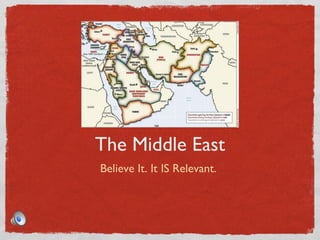Relevance of Studying the Middle East
- 1. The Middle East Believe It. It IS Relevant.
- 2. 1. Headline reaction ŌĆó The East is no longer something to ignore The politics, trends and events impact the West directly ŌĆó For example, traveling abroad; people might think twice due to past terrorist attacks, and what is occurring in the Middle East in the headlines. Due to these attacks and events there are tighter restrictions on airport security, longer lines, and screenings.
- 3. 2. Oil and Economy ŌĆó Most of the worldŌĆÖs oil reserves are in the Middle Eastern Region The higher the Middle East makes a country pay for oil barrels the more people pay at the pumps. ŌĆó War, rumors of war, or militancy can upset economic balance. Ex. In 2002 the Jakarta Stock Exchange fell by 10%, because investors worried foreign firms would pull out due to the bombings of two Bali night clubs.
- 4. 3. judo-Christian tradition ŌĆó There are 1.2 Billion Muslims in the world. An est. 5 million Muslims live in the U.S.; If you pay taxes you are supporting military and economic aid to both Israel and Egypt, as well as Turkey ŌĆó The BibleŌĆÖs origin is from Mesopotamia, Canaan, and Egypt; Hell has played a great part in Western religion, literature, and culture. Many movies/books have themes that originate from characteristics of Hell. Why do we have Sunday off? Sunday is a religious day of rest that is embedded into our culture that was birthed in the Middle East
- 5. 4. Irrational fear ŌĆó Muslims feel slighted and sometimes offended by Western stereotypes and connotations. Most Muslims renounce the terrorist attacks and condemn those who harm innocent civilians. ŌĆó Israeli Defense Forces argue that they should be called ŌĆ£Freedom FightersŌĆØ not terrorists. Most Middle Easterners are pacifists, and have never practiced violence, let along hold a gun.
- 6. 5. Art, History, Architecture ŌĆó The Middle East contains the most holiest sites (Wailing Wall, Dome of the Rock, Church of the Sepulcher) for the three largest practiced religions in the world; Islam, Judaism, and Christianity. 5 millennia of art and architecture tell the history of the Middle East. ŌĆó Pyramids and Tombs in Egypt give glimpses into ancient,civilized life.
- 7. 6. Humanitarian issues ŌĆó War and terrorism plague the Middle East. Somalia for instance in 1992 fell victim to civil war, and drought. ŌĆó Tribal warlords demand loyalty from starving population in return for food. ŌĆó Rival factions use force to sever food supply routes, and extort money from relief agencies. U.S, U.N peacekeepers went to Somalia to lend a hand in relief efforts. ŌĆó Peacekeepers still attend to countries that
- 8. 7. The Greatest asset ŌĆó Main reason to study the Middle East- People and their customs. Middle Easterners live a routined life, taking care of families, doing school work, playing games, playing sports, writing, laughing with friends, etc. ŌĆó Middle Easterners are some of the most hospitable people found on Earth. ŌĆó There are a few people who have ill views, but one most look at their side. ŌĆó Trash the stereotypes, and keep an open mind.
- 9. WHY STUDY the MIDdle East? ŌĆó SILLY QUESTION!!! ŌĆó The Middle East has negative connotations attached to it, due to terrorist events. We must learn to understand that the Middle East is part of the global community. The people, although a little bit more conserved, like to enjoy sports, parties, and time with family as much as we do. They practice a religion that has become part of Western culture, and they despise evil acts that harm innocent people. They have a civilized culture like the West with art, literature, and history. And we depend on them as much as they depend on us.
- 10. The Middle East Believe It. It IS Relevant.










